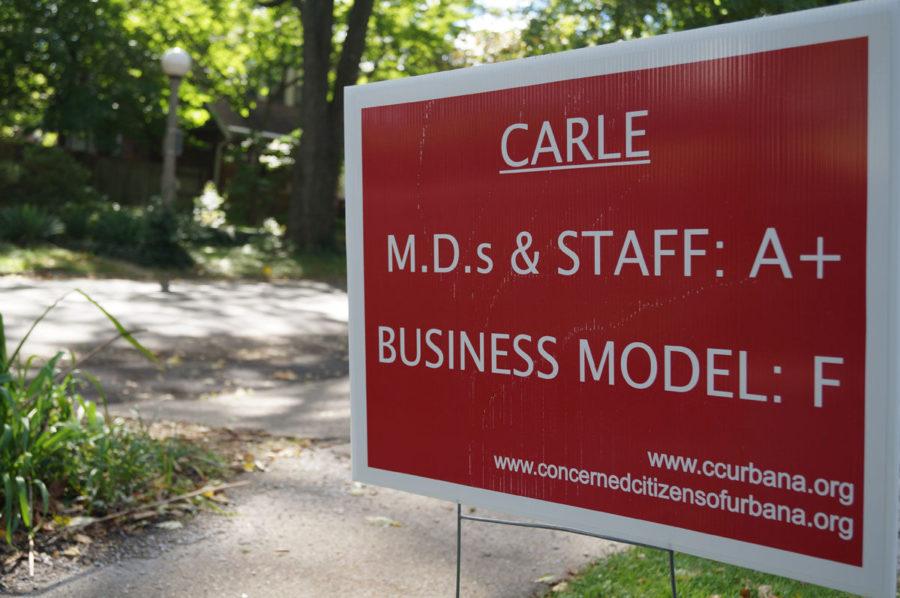City of Urbana and Carle at odds
Urbana Residents opposed to Carle Foundation Hospital’s status tax exemption for charity work have been posting signs in their yards to show their disapproval.
Dec 16, 2014
Last updated on May 10, 2016 at 11:05 p.m.
Carle Foundation Hospital’s mission says it “serves people through high quality care.” But some Urbana residents, including Alderman Charlie Smyth, Ward 1, expressed concern about how much the hospital truly cares about its residents after opening their property tax bills to a 10 to 11 percent increase, due in large part to the hospital’s tax-exempt status.
“Carle has an ethical and a moral responsibility to the community,” Smyth said in October. “They’re soiling their own backyard.”
Smyth was not alone in thinking the hospital was out-of-line to claim tax-exemption; some Urbana residents put signs in their yards in protest of the hospital’s exemption, reading “My family pays Carle’s share of taxes,” among other messages attacking the hospital’s business model.
Urbana Mayor Laurel Prussing said she believes Carle could easily pay its taxes and that the burden of extra property tax is placed onto Urbana residents. The city of Urbana accounts for approximately 87 percent of the property Carle operates on.
Get The Daily Illini in your inbox!
“Carle could much more easily pay its $10 million out of its $116 million profits than the city can afford a $1 million cut in its operating budget,” Prussing said in an October interview.
While some Urbana officials and residents felt unnecessarily targeted by the hospital’s tax-exemption, the legality of Carle’s status has been approved by the courts.
Article IX Section 6 of the Illinois Constitution states that certain bodies may qualify for tax-exemption given that they are “used exclusively for agricultural and horticultural societies, and for school, religious, cemetery and charitable purposes.”
After Carle Clinic and the Carle Foundation Hospital’s 2009 merger, they were first granted their tax-exempt status. Three years later, SB 2194, a 2012 amendment passed by Illinois General Assembly, permitted Carle, a not-for-profit hospital, to be tax-exempt on the basis of “charitable purposes.”
Despite the legality of the hospital’s tax-exemption, some Urbana citizens argued that Carle would have a better relationship with the residents it serves if it continued to pay property taxes as in the past. Some locals believe Carle’s financial success more than qualifies the hospital to carry on paying property taxes.
The Concerned Citizens of Urbana is a group of residents that have banded together in opposition to Carle’s tax-exemption and the resulting increase in taxes for Urbana residents. The group was actively involved in the making of yard signs that displayed opposition to Carle.
Dannie Otto, member of Concerned Citizens of Urbana, believes that Carle could manage to pay the property taxes as it did in the past, while some Urbana residents will struggle to manage with the extra financial burden.
“My tax bill went up about $1,000 in 2012 to 2013,” Otto said in a November interview. “And this will continue for years to come. Carle Hospital is making a net income of at least 25 percent, meaning they are extremely profitable with the money they have left over. Most companies wouldn’t even dream of that much net operation income.”
In November, Carle offered the city four grants, totalling $100,800, to help with the cost of Urbana’s police and fire protection. Seeing it as a “bribe” to quell or silence the ongoing issue between Carle and Urbana, Prussing refused the grants.
“You don’t get to choose what taxes you pay for,” Prussing said in a November interview.
The city of Urbana has since filed a suit against Carle regarding their tax exemption. The University has been invited to join the conversation by Prussing this December, who said that it is “in the long-term interest of the University of Illinois at Urbana-Champaign to promote healthy and sustainable local communities in order to attract students, faculty and staff.”
Charlotte can be reached at [email protected].






